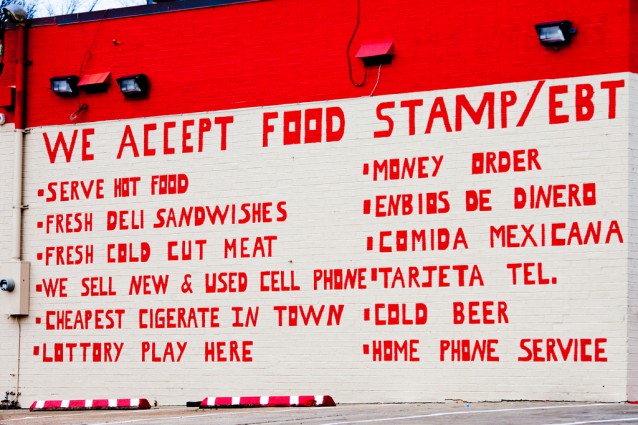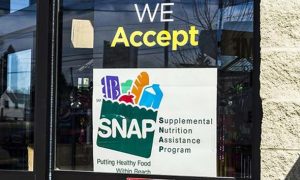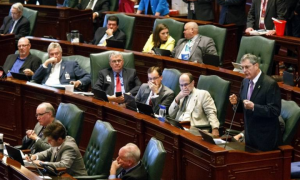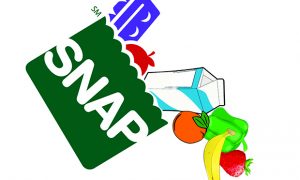Low-income Wisconsin families won’t be able to buy shellfish with food stamps, and will have a much harder time getting basics like dried beans, pasta sauce, and cooking spices into their kitchens, under the latest state-level Republican proposal to tighten the government’s grip on the poor.
A bill proposed by state Rep. Robert Brooks (R) would ban stores from accepting Supplemental Nutrition Assistance Program (SNAP) cards for lobster, shrimp, and any other form of shellfish, and set a long list of additional rules for the first two-thirds of a recipient’s monthly spending. Lawmakers held a committee hearing Thursday on the bill, which would require a federal waiver to implement.
An average of 420,000 households received SNAP each month in Wisconsin in 2014. The average recipient household got $220 per month from the program last year. Brooks’ restrictions would apply to all but $72.60 per month for the average household affected. And even that amount could not be spent on any form of shellfish.
But the fact that Brooks doesn’t want to go quite as far as the worst ideas of his colleagues doesn’t mean his proposal would benefit society or make it easier to get out of poverty. Adding more rules to the ones that already constrain food stamps families makes their shopping experiences more stressful and removes their already-limited control over what they put on the dinner table.
The law would restrict access to a whole range of commonplace ingredients. Some of the things that would be harder to buy for poor families who cook include “herbs, spices, or seasonings,” all nuts, red and yellow potatoes, smoothies, spaghetti sauce, “soups, salsas, ketchup,” sauerkraut, pickles, dried beans sold in bulk, and white or albacore tuna. (Cans of “light tuna” are allowed under the rules.)
To demonstrate the perils of food policing at Thursday’s hearing, a Democrat on the committee held up a plate of four different kinds of cheese. Although they are nutritionally indistinguishable, three of the four cheeses would be prohibited. “When you look at something like this cheese plate, there’s no evidence of sharp cheddar fraud. People are not buying sharp cheddar in order to defraud FoodShare, and there’s no nutritional difference. So if those are the stated goals, the bill is not accomplishing either,” Rep. Mark Spreitzer said.
Brooks’ bill is just the latest example of conservatives around the country being loudly concerned about the scourge of poor people making their own decisions. Kansas Republicans recently got a radical, unprecedented list of activities and purchases banned for SNAP and welfare recipients. The Maine GOP is working toward its own version of a “junk food ban,” while a Missouri version of the shellfish idea appears to be going nowhere in the statehouse.
The wave of hard-hearted food stamps laws follows a concerted effort in right-wing media to portray beneficiaries as greedy swindlers. The “young buck buying t-bone steaks” image that Ronald Reagan used to smear SNAP recipients in the 1970s and ’80s has been updated thanks to a Fox News special report.
The conservative cable network relentlessly hyped an interview with a jobless California surfer named Jason Greenslate who bragged about using SNAP to buy lobster, and even delivered copies of the special report to members of congress ahead of a 2013 vote on major cuts to the food stamps budget.
Despite conservative portrayals of the program as a bottomless giveaway that’s grown out of control in recent years, the reality of any safety net program is that when the economy is lousy, enrollment and total costs jump. Total spending on SNAP — which generates about $1.80 in economic activity for every dollar it costs the Treasury — is already trending downward on its own thanks to the gradual recovery. Fraud is vanishingly rare in the program. And the typical food stamps family is working and raising children, not surfing.
Source: Thinkproress

















































































































































































































































![[Video] Chicago Police Officers Caught On Video Telling Two Black Men "We Kill Mother F**kers"](https://earhustle411.com/wp-content/uploads/2018/07/evil-cop-3-300x180.jpg)
![[Video] Chicago Police Officers Caught On Video Telling Two Black Men "We Kill Mother F**kers"](https://earhustle411.com/wp-content/uploads/2018/07/evil-cop-3-80x80.jpg)












![[Video] White Woman Calls The Cops On Black Real Estate Investor, Cops Threaten To Arrest Her For Harassing Him](https://earhustle411.com/wp-content/uploads/2018/05/nosy-neighbor-300x180.png)
![[Video] White Woman Calls The Cops On Black Real Estate Investor, Cops Threaten To Arrest Her For Harassing Him](https://earhustle411.com/wp-content/uploads/2018/05/nosy-neighbor-80x80.png)


![White Scientist Says The Black Community Is Being Targeted By The Medical System, They Are Deliberatly Being Poisoned [Video]](https://earhustle411.com/wp-content/uploads/2016/05/mike-adams-300x180.jpg)
![White Scientist Says The Black Community Is Being Targeted By The Medical System, They Are Deliberatly Being Poisoned [Video]](https://earhustle411.com/wp-content/uploads/2016/05/mike-adams-80x80.jpg)








![Teenage Girl Shot In Her Stomach Three Times But Took Time To Post To Facebook [ Video]](https://earhustle411.com/wp-content/uploads/2016/02/Gangster-chick-300x180.jpg)
![Teenage Girl Shot In Her Stomach Three Times But Took Time To Post To Facebook [ Video]](https://earhustle411.com/wp-content/uploads/2016/02/Gangster-chick-80x80.jpg)







